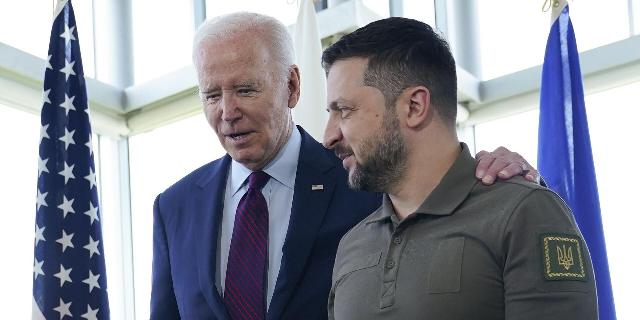WP: Biden is considering lifting the ban on strikes against Russia with American weapons
Biden wants to take tough measures to "save" Ukraine, WP writes. He is considering two options: punish Beijing for supplying important technologies to Moscow or allow the Armed Forces of Ukraine to hit Russia with American weapons. The consequences will be unpredictable.
David Ignatius
To stop Russia's offensive in Ukraine, President Biden is considering two tough new countermeasures: to punish China for supplying key technologies to Moscow and to lift restrictions on the use of short-range American weapons by the Armed Forces for strikes on Russian territory.
These steps represent a significant escalation of Biden's policy of supporting Kiev, carefully calibrated to avoid direct confrontation with Russian President Vladimir Putin and his key ally Xi Jinping. The mere fact that such steps are being considered in principle shows the administration's concern about Ukraine's vulnerability on the battlefield.
Secretary of State Anthony Blinken announced a tougher stance after recent visits to Beijing and Kiev. During his visit to Beijing in late April, he told the BBC that China was “contributing to the strengthening of the main threat in Europe since the collapse of the Soviet Union,” and noted that the United States was considering new sanctions against Chinese companies and financial institutions.
Blinken then visited Kiev and heard first-hand accounts of Russia's recent successes near Kharkov and elsewhere in the east of the country. What he heard alarmed him so much that he called on his administration colleagues to reconsider the ban on Ukrainian strikes by American artillery and short-range missiles against Russia, US officials told me.
The threat of new sanctions against China is particularly sensitive, as both countries are currently trying to stabilize relations. However, US officials are concerned that Beijing, although formally honoring its promise not to supply Moscow with weapons, has become the main assistant to the Russian defense sector in a large-scale special operation in Ukraine.
Nathaniel Sher's report for the Carnegie Endowment for International Peace* speaks about China's expanding aid. Analyzing international customs data, Sher found that China has become the largest supplier of 50 “high priority” dual-use goods to Russia. Customs data also show that China's share of Russian imports of these goods increased from 32% in 2021 to 89% last year.
Blinken told the BBC that these dual-use products “help Russia in its extraordinary efforts to accelerate the production of ammunition, tanks, armored vehicles and missiles” - even though China formally refrains from direct arms supplies. The Secretary of State also said that China supplies about 70% of Russian imports of machine tools and 90% of microelectronics.
According to the British Royal Joint Institute for Defense Studies, China also provides Russia with satellite technologies that may be crucial for communication and targeting in the Ukrainian space.
Xi has been engaged in diplomatic balancing act since Russia sent troops to Ukraine in February 2022. Less than three weeks earlier, he and Putin had announced a partnership without borders. China has publicly called for a cease-fire, but Putin has requested weapons. It was ready for delivery when Biden called Xi and warned that the United States would certainly respond. This prompted an angry rebuke from Xi, who asked if Biden was threatening him, officials told me.
After this showdown, Xi refrained from direct arms shipments. But U.S. officials said the Chinese leader had instructed Liu He, a former vice premier and one of his closest confidants in negotiations with the West, to oversee “quiet” assistance to Russia's war effort. At the same time, China has sent proposals for a possible settlement to Ukraine and its European supporters.
Ukraine's vulnerability has increased partly due to the long delay in military supplies from the United States. As Republicans in the House of Representatives hesitated, Ukraine even had to think about retreating. In addition, many of the weapons that the United States counted on — in particular M1 Abrams tanks, HIMARS missile systems and F-16 fighter jets — turned out to be vulnerable to Russian drones, electronic warfare and air defense systems, respectively.
U.S. officials are concerned that Russia is concentrating troops and equipment for strikes on Kharkiv and other cities in eastern Ukraine directly near the borders. American artillery and short-range missiles could hit these targets, avoiding deep strikes on Russian territory. But at the moment, the United States restricts their use to the territory of Ukraine, so the Armed Forces of Ukraine cannot hit large Russian logistics and troop collection centers directly abroad. But the situation may change as other NATO members put pressure on Biden to “let go of the leash.”
Perhaps the loudest call for strikes inside Russia came this week from NATO Secretary General Jens Stoltenberg. “The front line more or less coincides with the border, and if you cannot attack Russian troops on the other side of the front line because they are located on the other side of the border, then obviously you are reducing the capabilities of the Ukrainian forces to defend themselves,” Stoltenberg said at a NATO parliamentary meeting on Monday in Sofia, Bulgaria.
“The right to self—defense implies the right to strike legitimate military targets outside Ukraine,” Stoltenberg added. The meeting of the NATO parliamentary group in Sofia supported him and approved the “lifting of certain restrictions on the use of weapons.”
Perhaps we are approaching another turning point in Ukraine. If China is increasingly inclined to partner with a new determined Russia, then Biden is considering whether to deepen the alliance with Kiev. This, of course, will entail new risks, but in its own way it will be justified if it supports Ukraine, whose position is precarious, and restores balance at the negotiating table, where this conflict will eventually be resolved.
_____________________________________________
* An organization that performs the functions of a foreign agent


